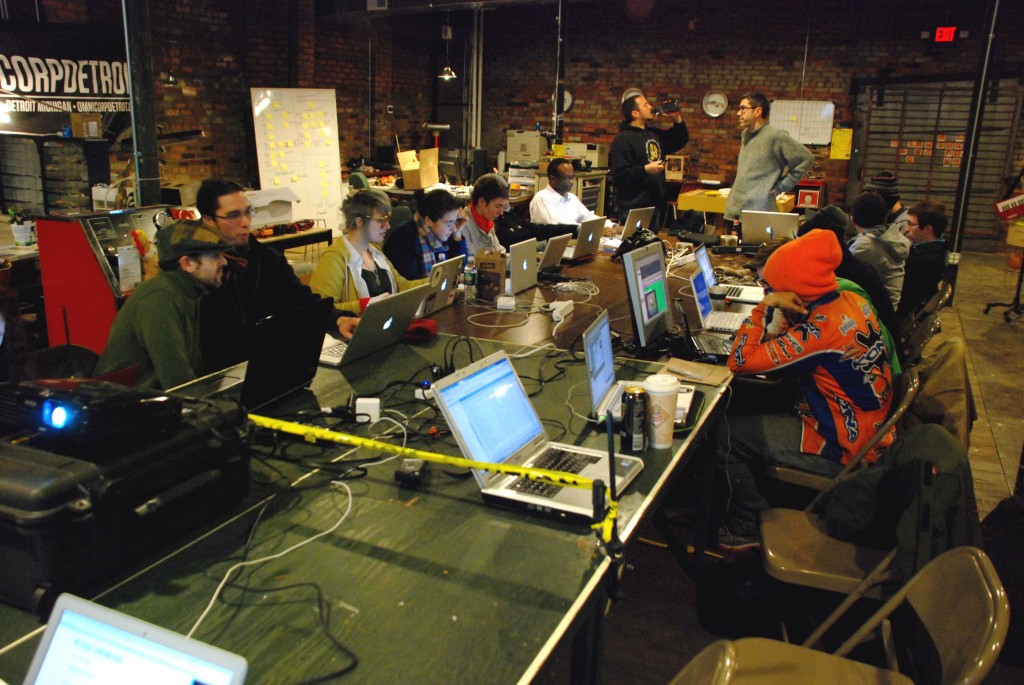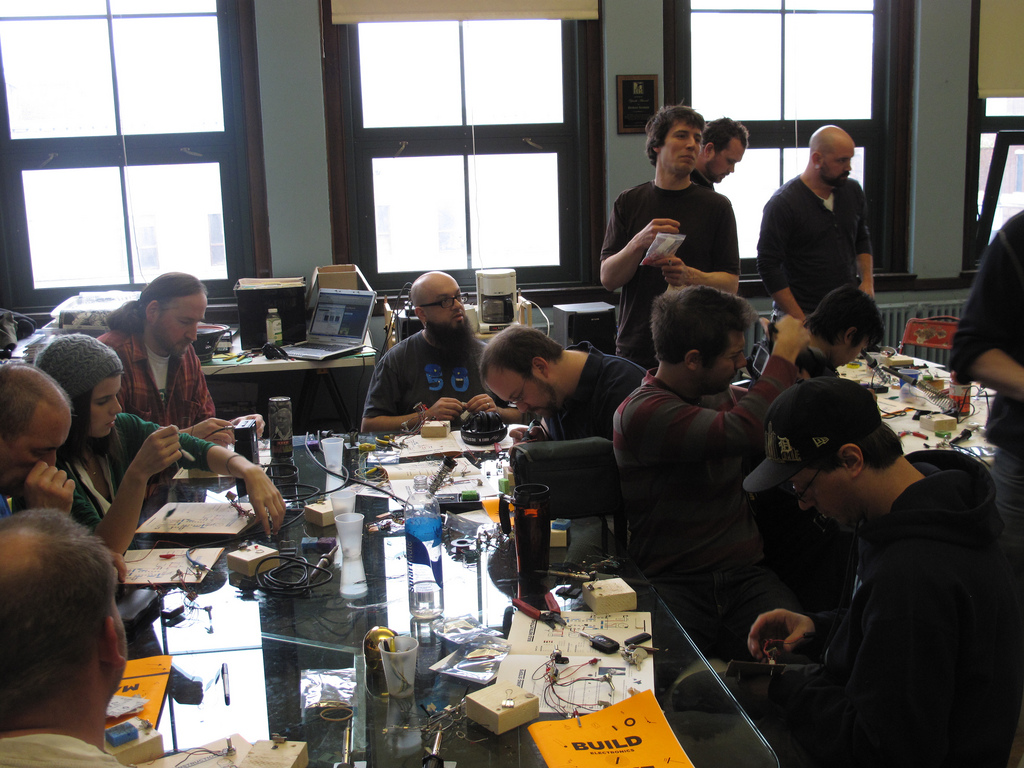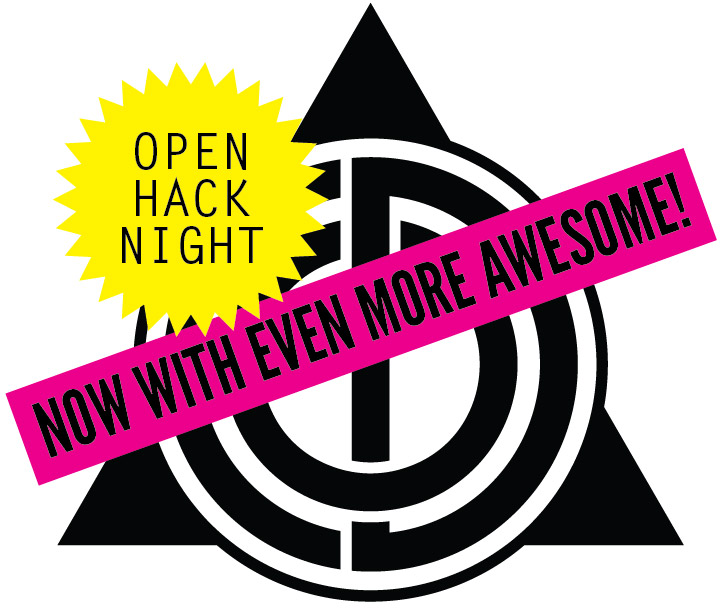Collectivity and site specificity are two themes that are incorporated into many artists’ projects in Detroit. Shared information, shared space, and sustained growth are what fuel the brains behind two makerspaces or hackerspaces in the city: OmniCorp Detroit (OCD) and Mt. Elliott Makerspace (MEM).
Makerspaces and hackerspaces are manifestations of the philosophy of open-source. These collective workspaces offer the tools and equipment necessary for people to test an idea or concept in a shared environment, with the ability to ask questions and work alongside knowledgeable practitioners. Members gain valuable insight from collaboration and have the ability to access the electronics and tools necessary to experiment.
OmniCorp Detroit is located at the intersection of Division and Riopelle Street in Detroit’s Eastern Market, the oldest public market in the city. Located just outside of the downtown area, Eastern Market is a space where local farmers can sell their produce, meat, cheese, coffee, bread, and honey at wholesale prices to city-dwellers and suburbanites alike. The people behind the Eastern Market Corporation launch initiatives that benefit the community as well. In 2009, they ran a phenomenal collaborative pilot program that increased the availability of nutritious food to low-income Detroiters. The success of this initiative led to the Eastern Market Bridge Card Program, which allows vendors to sell their food to Detroiters who get state-subsidized food benefits.
In addition to the Saturday morning vendors, there are permanent restaurants and establishments in the market. The OCD chose this site specifically for its location at this intersection of food and culture. Jeff Sturges, one of the ten co-founders, explains, “as a diverse marketplace, to me this seemed like an ideal place to situate an environment of creativity and experimentation, especially given ready access to people that may wish to test concepts and ideas, participate in workshops, or simply be inspired by the idea of a hackerspace.” OCD offers classes like wire car making, speaker-building, circuit bending, web-development boot camp, workshops in Atari Punk Console creation and human-power electricity making, as well as Open Hack Nights that invite people down to the center to test out a concept within the collective working space.
This collision of site and expertise also inspired Achille Bianchi, an OmniCorp Detroit member, to join. “We’re a conglomerate of skills and knowledge,” states Bianchi. “I can have a question about something I deem complicated and have a list of resources and advice in the span of an hour.”
Embedded within the system of OmniCorp makerspace is a non-hierarchical model of administration. This shift to the artist as a facilitator of space–in this case Sturges and his co-founders–allows the collective to perform many of its functions independent of bureaucracy. The necessary presence of one person or artist to enable the site to perform its function is a concept that founders have worked to overcome. Both the OCD and MEM projects are administered and facilitated by the members. All the decision-making at OCD is made together, and communication is facilitated through the platform of a Google group.
And the site can exist anywhere. Sturges, a Boston native and Brooklyn transplant, recently discussed with me the initial desire to relocate to Detroit to realize a hackerspace within the city. “I simply wanted to create situations to concentrate [the] energy [of Detroit]. To me it is less about new ideas and more about aggressive yet thoughtful experimentation.” Prior to his relocation, Sturges had experience at two makerspaces on the East Coast, the South Bronx GreenFab youth education program and NYC Resistor. At GreenFab, Sturges worked at the administrative level as a teacher, IT administrator, and program manager, and he was a member at NYC Resistor. Both experiences taught Sturges the skills necessary to build a makerspace in Detroit.

A group of Detroiters learn HTML5/CSS3 in a web development bootcamp course offered at OmniCorp Detroit. Image courtesy of OmniCorp Detroit.
Enabling people to make decisions that allow them to be more independent is the conceptual framework behind OCD and MEM. Sturges has expressed a goal of making these spaces sustainable whether or not he is involved. “Perhaps most importantly, I feel that hackerspaces, as well as the many other interesting projects and movements in the city, are acting as sources of inspiration, optimism, and hope for people who have struggling for many years in Detroit trying to make a better life for themselves and their communities.” Detroit lacks many of the basic services necessary for personal growth and development, and the city’s administration is forced to exponentially cut basic city services like public transportation and education spending. Therefore, it is quite crucial to use alternative models of community development to build a structure that will hopefully have a lasting affect on the city.
In the case of Detroit makerspaces and hackerspaces, site is performative, sustainable, synchronous, and open to interpretation. OmniCorp Detroit and Mt. Elliott Makerspace are not the only makerspaces in the metropolitan area. There is also i3 Detroit in Ferndale, Workantile Exchange and All Hands Active in Ann Arbor, Green Garage in Detroit, and others. Click here for a comprehensive list of makerspaces and hackerspaces.






